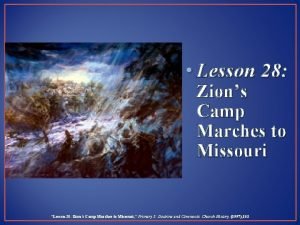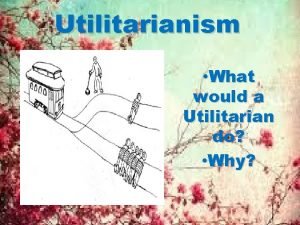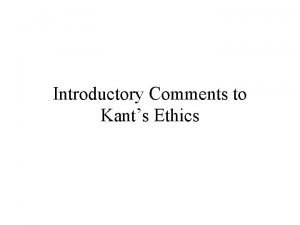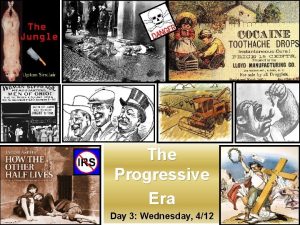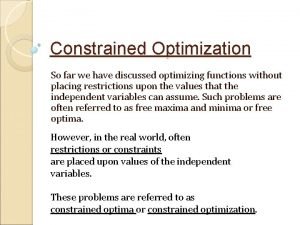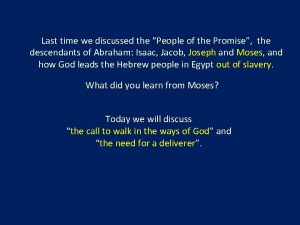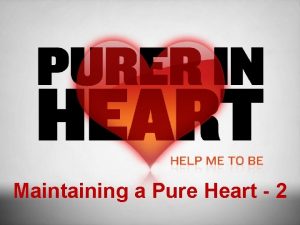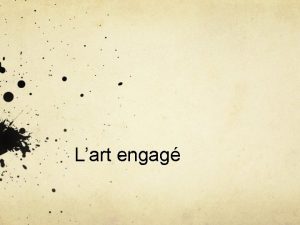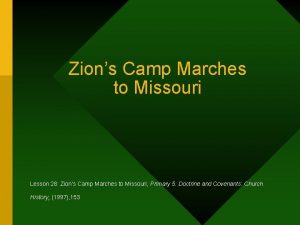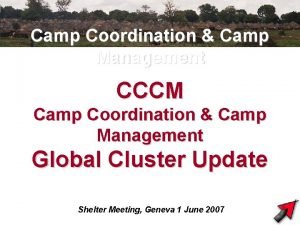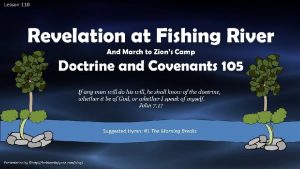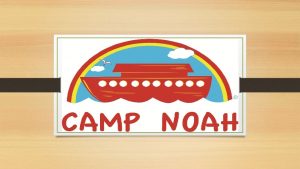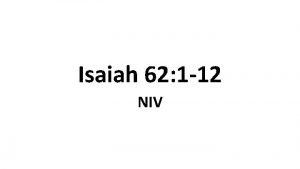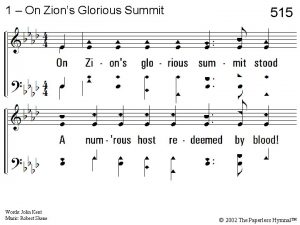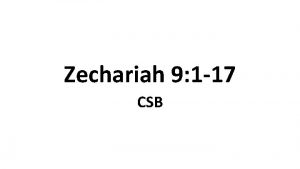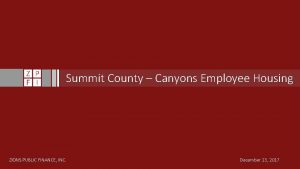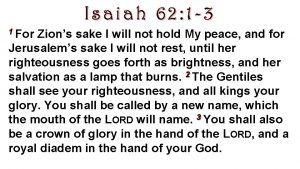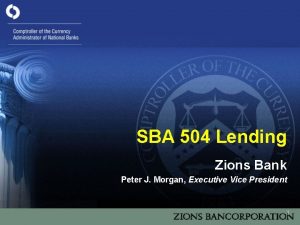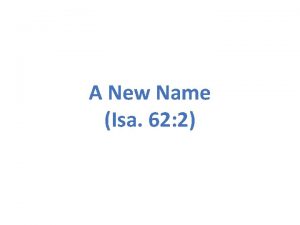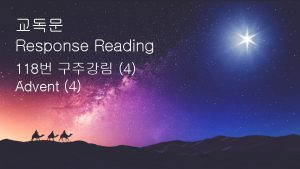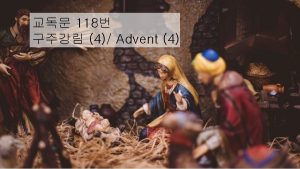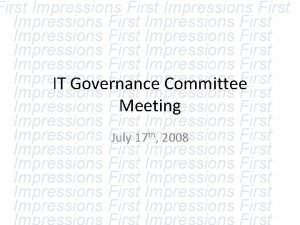Zions Camp was first discussed at the home


































































- Slides: 66

Zion’s Camp was first discussed at the home of Joseph Smith on February 24, 1834, when the Kirtland High Council met to give an audience or hearing to Lyman Wight and Parley P. Pratt, delegates from the Church in Missouri (Joseph Smith, History of the Church 2: 39). Elders Pratt and Wight, who had left their families in Missouri without protection from mob violence and persecution, had come to solicit help and guidance from the leadership of the Church. Parley described his desperate journey from Jackson County to Kirtland: “I was at this time entirely destitute of proper clothing for the journey; and I had neither horse, saddle, bridle, money or provisions to take with me; or to leave with my wife, who lay sick and helpless most of the time.

Under the circumstances I knew not what to do. Nearly all had been robbed and plundered, and all were poor. ” A man named Higbee, “moved by the Spirit, ” gave him a horse and saddle. Sidney A. Gilbert, whose store had been “broken up, and his goods plundered and destroyed by the mob, ” gave him some material, which some women made into a suit, and Brother Gilbert furnished a coat. “Faith and the blessings of God had cleared up our way to accomplish what seemed impossible, ” he continued. “We were soon ready, and on the first of February we mounted our horses, and started in good cheer to ride one thousand or fifteen hundred miles through wilderness country. We travelled every day, whether through storm or sunshine, mud, rain or snow” (Pratt, Autobiography of Parley P. Pratt, 107 -09).

The Distance that Elders Pratt and Wight travelled

Sidney A. Gilbert Store

Lyman Wight also placed his faith in the Lord. Before he left, it was reported, “his wife lay by the side of a log in the woods, with a child three days old and he had three days’ provisions on hand” (Millennial Star 27, July 22, 1865: 455). After Joseph heard of the problems in Missouri, “he burst into tears and sobbed aloud, ‘Oh my brethren… Would that I had been with you, to have shared your fate’” (Lucy Mack Smith, History of Joseph Smith, 225). On the day Parley P. Pratt and Lyman Wight arrived in Kirtland from Missouri, Joseph Smith received a revelation (Doctrine & Covenants 103) that directed him to gather the young and middle-aged men and lead them to Missouri. The first group left on May 1 st, the second four days later.

God is more concerned with growth than with geography. Thus, those who marched in Zion’s Camp were not exploring the Missouri countryside but their own possibilities (Neal A. Maxwell, Ensign, November 1976, 14). I don’t think God is too interested in real estate. He owns it all anyway. He does seem to be incredibly interested in what happens to us individually and will place us in those circumstances where we have the most opportune chances to grow and to carry out our purposes (Neal A. Maxwell, “But for a Small Moment, ” 451).

Just before they left on Zion’s Camp Joseph approached Oliver Cowdery and Zebedee Coltrin while they were standing at a street corner in New Portage, Ohio (Southwest of Kirtland). Joseph said, “If you will come with me I will show you visions. ” Zebedee Coltrin said that the Prophet took them outside of town on a hillside where there was an arch of wild grapes. He said that Joseph laid under the arch, stretched his arms out and said, “Here brethren, lay on my arms and use them for pillows, and I will remove the veil for you. ”

So they did and by his mighty faith, Joseph rolled back the veil and there in the heavens was a man and a woman seated upon beautiful thrones. Joseph than asked them, “Brethren, do you know who they are? ” They did not and so Joseph said, “Let me introduce you to your first parents, to your father Adam and his queen, mother Eve. ” Zebedee said that they were allowed to converse with Adam and Eve in the vision (Remember Joseph saw Adam many times). This was a marvelous experience for these two men to have prior to the beginning of Zion’s Camp.

Why Zion’s Camp? The Saints had been driven out of Jackson County to Clay County. They were going back to redeem the land. They settled in Clay County from 1834 -36. They purchased land in Northern Missouri and then moved north.

Doctrine & Covenants 103: 27 -28, 30 -34 Obtain 500, this is my will. Men do not always do my will. Obtain 300, but no less than 100. 207 men, 11 children, 11 women at it’s largest point.

Joseph’s Prophecy Joseph Smith declared to Brigham Young that if he would go with him in the camp to Missouri and keep his counsel, “I promise you, in the name of the Almighty, that I will lead you there and back again, and not a hair of your head, shall be harmed” (History of Brigham Young, Millennial Star, 18 th July, 1863, 455).

Daniel Dunklin-Governor of Missouri

Daniel Dunklin-Governor of Missouri He was somewhat responsible for Zion’s Camp because when the brethren petitioned for assistance, he asked if they were willing to fight to get their land, homes and property back. They said they were. He then said, “If you can raise a force to come down and take your land, I will guarantee your rights. ” When Zion’s Camp got to Missouri, he all of the sudden didn’t remember ever having said those things. He gave his solemn word and then went back on it.

After hearing the report, Joseph declared that he was going to Zion to redeem the land called for the council's assent. The members agreed unanimously, nominating Joseph as “commander in Chief of the Armies of Israel. ” It was said, that the prophet had a sword over four feet long. Some men had equipped themselves with four or five pistols.

Zion’s Camp did attempt a mild military order, but Joseph was short on military discipline. The men were organized into companies of twelve with a captain over each. Joseph chose twenty men for his bodyguards, fearing that he was a target for the Missourians.

The Mini-Exodus for the Great Exodus! A distance of 900 miles (Rexburg to Seattle). Some of the men made the journey without shoes (Martin Harris), and some without socks (Lyman Wight). They did not travel on Sunday.

Sundays were for preaching. Morning reveille was at 4: 00 a. m. They traveled on the average each day about 25 miles. Some journals record as much as 30 -40 miles per day. They left on May 1 st, 1834 and disbanded on June 24 th, 1834.

The average on Zion’s Camp was 29, the youngest being 16 (George A. Smith), and the oldest 79 (Samuel Baker). Joseph Smith said, “We know that angels were our companions, for we saw them” (History of the Church, 273). Heber C. Kimball mentioned that his boots would often fill with blood. There was one non-member on the trip named Dean Gould. He was baptized before the journey was over by Lyman Wight. Oliver Cowdery and Sidney Rigdon were left in Kirtland to supervise the construction of the temple (interesting because both of them eventually left the Church).

George A. Smith

Reuben Mc. Bride’s Journal Almost every day they sang the following song about the Trumpeters: Mormon Church History-LDS Zion's Camp-1/3 Hark listen to the trumpeters, they call for volunteers, On Zion’s bright and flowery mount, behold the officers. Their horses white, their armor's bright, with courage bold they stand Enlisting soldiers for their king, To march to Zion’s land. It set my heart all in flame, a soldier for to be I will enlist, gird on my arms and fight for liberty We want no cowards in our bands, that well our colors fly

We call for valiant hearted men who are not afraid to die. To see our armies on parade, how marshaled they appear, All armed and dressed in uniform, they look like men of war. They follow their great General, the great eternal Lamb, His garments stained in his own blood, King Jesus is his name.

Reuben Mc. Bride

Other Stories! John the Beloved: Campbell and Owens: Campbell prophesied that turkey buzzards would eat his hide if he did not kill Joseph (I guess wicked people can prophecy).

Sylvester Smith’s Constant Murmuring: (the horse and the dog) Joseph later said that Sylvester had the same spirit as the dog. Don’t kill the snakes: Joseph taught that snakes would never lose their venom until we lost ours. Solomon Humphries woke up from a nap with a rattle snake curled up with him.

The Squirrel and Orson Hyde’s rifle: Turtle or Snake Eggs? Martin Harris and His Snake Handling Abilities (Mark 16: 18). Fishing River and a mob of 300. The water raised 40 feet in one night. God was in that storm!

Joseph Providing Water: Joseph with a spade dug a hole in the middle of the prairie at their campsite. Parley P. Pratt while watching over the camp at night was awakened by an angel after he had fallen asleep. Joseph told him that was one of the angels that was assigned to protect the camp. “We don’t eat stinking meat!” (Zebedee Coltrin was the cook).

Zelph Regardless of the many differences in these accounts, Joseph received some divine understanding concerning Zelph, apparently through visionary means, as noted in the following published report: We encamped on the bank of the Illinois River until Tuesday the 3 rd during our travels we visited several of the mounds which had been thrown up by the ancient inhabitants of this county, Nephites, Lamanites & c. , and this morning I went up on a high mound, near the river, accompanied by the brethren… On the top of the mound were stones which presented the appearance of three altars, … and human bones were strewn over the surface of the ground. The brethren procured a shovel and hoe, and removing the earth to the depth of about one foot discovered the skeleton of a man, almost entire, and between the ribs was a Lamanitish arrow, which evidently produces his death.

Elder Brigham Young retained the arrow and the brethren carried some pieces of the skeleton to Clay county. The contemplation of the scenery before us produced peculiar sensations in our bosoms; and the visions of the past being opened to my understanding by the spirit of the Almighty I discovered that the person whose skeleton was before us, was a white Lamanite, a large thick set man, and a man of God. He was a warrior and chieftain under the great prophet Omandagus, who was known from the Hill Cumorah, or eastern sea, to the Rocky Mountains. His name was Zelph. The curse was taken from him, or at least, in part; one of his thigh bones was broken, by a stone flung from a sling, while in battle years before his death. He was killed in battle, by the arrow found among his ribs, during the last great struggle of the Lamanites and Nephites (“History of the Church, 2: 79 -80). Another record says that Elder Burr Riggs retained the arrow.

Levi Hancock recorded the following in his journal relative to Zelph (as written in his journal). “on the way to illinois river where we camped on the west side in the morning many went to see the big mound about a mile below the crossing I did not go on it but saw some bones that was brought with a broken arrow they was layed down by our camp joseph addressed himself to sylvester Smith this is what I told you and now I want to tell you that you may know what I meant this land was called the land of desolation and onendagus was the king and a good man was he there in that mound did he bury his dead and did not dig holes as the people do now but they brought there dirt and covered them until you see they have raised it to be about one hundred feet high the last man buried was zelf he was a white lamanite who fought with the people of onendagus for freedom when he was young he was a great warrior and had his thigh broken and never was set it knitted together as you see on the side.

He fought after it and got strength until he lost every tooth in his head save one when the lord said he had done enough and suffered him to be killed by that arrow you took from his brest these words he said as the camp was moving off the ground as near as I could learn he had told them something about the mound and got them to go and see for themselves I then remembered what he had said a few days before while passing many mounds on our way that was left of us said he there are the bodies of wicked men who have died and are angry at us if they can take the advantage of us they will for if we live they will have no hope I could not comprehend it but supposed it was all right” (Levi Hancock Journal).

Cholera On June 3 rd, 1834 the Lord revealed to Joseph that a scourge would come upon the camp in consequence of the fractious and unruly spirits that appeared among the brethren, and they should die like sheep with the rot; still, if they would repent and humble themselves before the Lord, the scourge, in a great measure, might be turned away; but, as the Lord lives, the members of the camp will suffer for giving way to their unruly temper” (History of the Church, 2: 80).

Twenty-one days later the prophecy was fulfilled. Joseph recorded: “June 24, --- This night the cholera burst forth among us, and about midnight it was manifested in its most virulent form. Our ears were saluted with cries and moaning, and lamentations on every hand; even those on guard fell to earth with their guns in their hands, so sudden and powerful was the attack of this terrible disease. At the commencement, I attempted to lay on hands for their recovery, but I quickly learned by painful experience, that when the great Jehovah decrees destruction upon any people and makes known His determination, man must not attempt to stay His hand.

The moment I attempted to rebuke the disease I was attacked, and had I not desisted in my attempt to save the life of a brother, I would have sacrificed my own. The disease seized upon me like the talons of a hawk, and I said to the brethren: “If my work were done, you would have to put me in the ground without a coffin. ”

When the cholera made its appearance, Elder John S. Carter was the first man who stepped forward to rebuke it, and upon this, was instantly seized, and became the first victim in the camp. He died about six o’clock in the afternoon; and Seth Hancock died about thirty minutes afterwards. Erastus Rudd died about the same moment, although a half a mile distant. He was buried by Jesse Smith, George A. Smith and two or three others, and while burying him, Jessie Smith was attacked with the cholera.

As it was impossible to obtain coffins, the brethren rolled the corpses in blankets, carried them on a horse-sled about half a mile, buried them on the bank of a small stream, which emptied into Rush Creek, all of which was accomplished by dark. When they had returned from the burial, the brethren unitedly covenanted and prayed, hoping the disease would be stayed; but in vain. While thus covenanting, Eber Wilcox died; and while some were digging the grave, others stood sentry with their fire arms, watching their enemies” (History of the Church, 2: 114 -16). About sixty-eight of the Saints suffered from this disease, of which fourteen died (History of the Church, 2: 119 -20).

The disease instantly fastened itself upon us and in a few minutes we were in awful distress… We were scarcely able to stand upon our feet… and we were greatly alarmed fearing that we should die in this western wilderness… the cramp seized the calves of my legs… gathering the cords into bunches and then the operation extended in like manner all over my system. I cried heartily unto God but the Heavens seemed sealed against us and every power that could render us any assistance shut within its gates… In short time afterwards Hyrum sprung to his feet and exclaimed Joseph we shall return for I have seen an open vision in which I saw Mother on her knees under an apple tree praying for us and she is even now in tears asking God to spare our lives that she may behold us again in the flesh and the spirit testifies to me that her prayers and ours shall be heard– and from that moment we were healed and went on our way rejoicing (Lucy Mack Smith, MS. , 151 -52, LDS Archives).

Joseph’s Vision of those who died of Cholera: Joseph later related a vision he had received of “the state and condition of those men who died in Zion’s Camp. Brethren, I have seen those men who died of cholera in our camp, and the Lord knows if I get a mansion as bright as theirs, I could ask no more. ” As he related the details of the vision he wept, and at times could not speak (History of the Church, 2: 181 n).

The Prophet Joseph Smith Told the Brethren of Zion’s Camp: “Brethren, some of you are angry with me, because you did not fight in Missouri; but let me tell you, God did not want you to fight. He could not organize His kingdom with twelve men to open the Gospel door to the nations of the earth, and with seventy men under their direction to follow in their tracks, unless He took them from a body of men who had offered their lives, and who had made as great a sacrifice as did Abraham” (History of the Church, 2: 182).

Joseph Suffered Too! “The Prophet Joseph took a full share of the fatigues of the entire journey. In addition to the care of providing for the Camp and presiding over it, he walked most of the time and had a full proportion of blistered, bloody, and sore feet, which was the natural result of walking from 25 to 40 miles a day in a hot season of the year. But during the entire trip he never uttered a murmur or complaint, while most of the men in the Camp complained to him of sore toes, blistered feet, long drives, scanty supply of provisions, poor quality of bread, bad corn dodger, frowzy butter, strong honey, maggoty bacon and cheese, etc.

Even a dog could not bark at some men without their murmuring at Joseph had to bear with us and tutor us like children. There were many, however, in the Camp who never murmured and who were always ready and willing to do as our leaders desired” (George A. Smith, “My Journal, ” Instructor, May 1946, 217).

Lessons Learned From Zion's Camp: Sacrifice Obedience Preparation for the Great Exodus Mentoring for nine of the Twelve future Apostles

Mentoring for all of the future Presidents of the Seventy. Mentoring for 63 of the 70 called to be in the Quorum of the Seventy. Helped the men learn how to handle contention.

In an address to the Saints in the Salt Lake Valley nineteen years later, Brigham Young summarized his feelings about his experience in Zion’s Camp: “When I returned from that mission… a brother said to me, ‘Brigham, what have you gained by this journey? ’ I relied, “Just what we went for; but I would not exchange the knowledge I have received this season for the whole of Geauga County; for property and mines of wealth are not to be compared to the worth of knowledge” (Journal of Discourses 2: 10).

In 1869, Elder Wilford Woodruff declared: “We gained an experience that we never could have gained in any other way. We had the privilege of beholding the face of the prophet, and we had the privilege of travelling a thousand miles with him, and seeing the workings of the Spirit of God with him, and the revelations of Jesus Christ unto him and the fulfillment of those revelations… had I not gone up with Zion’s Camp I should not have been here today” (Journal of Discourses, 13: 158).

Doctrinal Content Involved in Missouri During Zion’s Camp There was a lot of complaining and backbiting involved with the Saints in Missouri. Some members claimed that all doctrine had to come through the gift of tongues. This included all revelations. They said that if Joseph Smith himself came amongst them, they were not bound by him unless he gave the revelation in tongues. One of their doctrines was that those destined to perdition, including Satan and his followers could dissolve back into primeval intelligence and then God would return them back through the program again as spirits, then as mortals, and so forth. There are still some today who have such thoughts in the Church (Oliver Cowdery denounced it as doctrine from the Devil).

Joseph’s journal that he kept on the trip was lost on the journey. A brief account prepared during Joseph’ lifetime was not printed until after his death. Heber C. Kimball, George Albert Smith and Wilford Woodruff all helped with notes from their own journals. George A. Smith who was seventeen years old was forced one hot day to drink slough water, he learned to “strain wigglers” with his teeth.

A revelation had said an angel would go before them like Israel in the wilderness, and one camp member, Heber C. Kimball, said angels were seen. When Joseph turned over a spade full of earth and found water, some exclaimed that “it was as much a miracle as when Moses smote the rock and water came out. ” Happenings like this led Levi Hancock to say, “Truly we had seen the hand of God in our favor all the way. ”

Like everyone else, Joseph wanted evidence of God’s backing. The expulsion from Zion had shaken his confidence. The story of Zelph perplexed Levi Hancock, who later noted, “I could not comprehend it, but supposed it was alright. ” A shouting match between Sylvester and Joseph resulted in Joseph’s throwing the camp bugle at him. Several of the men apostatized because they did not have the privilege of fighting.

Zion’s Camp broke up on July 9 th, 1834. Joseph started home with fifteen brethren which included George A. Smith. The expedition to Missouri in 1834 was called Joseph Smith’s first major failure. Nothing that Joseph aimed to accomplish came about. Several hundred men spent three months walking two thousand miles; fourteen of them never went home.

Nothing the camp did improved the situation in Jackson County. However, most camp members felt more loyal to Joseph than ever, bonded by their hardships. The future leadership of the Church came from this group. After experiencing Jackson County’s anger and backing off, Joseph still predicted a return within two years.

Charges Within two weeks after getting back from Missouri in early August of 1834, Joseph was brought before a High Council by the quarrelsome Sylvester Smith brought charges of “criminal conduct. ” As Sylvester Smith learned, Joseph did not like to be crossed. His own followers were sometimes shocked by his flashes of anger. But in the end they backed him. Their dismay at his anger was balanced by their love of his good nature. His warm-hearted friendship more than compensated for the occasional tirades.

Priesthood and Church Government 1834 -35 During the course of Sylvester Smith’s hearings, twenty-eight men spoke their minds, some as members of the council, others as observers in the meeting. By the end of the hearings Joseph could say, “I now swim in good clean water, with my head out. ” Joseph did not attend to details the way Brigham did, but he could certainly organize. Joseph thought institutionally more than any other visionary men of his time, and the survival of his movement can largely be attributed to this gift. Soon after the Church was organized Joseph adopted the practice of bringing councils together.

The Character of a Prophet-1834 His own followers were sometimes disappointed. He was a “lubbery fellow, ” one said. “He looked green and not very intelligent, ” wrote another. Others were struck by his charisma. Mary Hales said that “on shaking hands with Joseph Smith, I received the Holy Spirit in such great abundance that I felt it thrill my whole system, from the crown of my head to the soles of my feet. I thought I had never beheld so lovely a countenance.

Nobility and goodness were in every feature. Some doubted his capacities: one visitor to Nauvoo found “his language and manner were the coarsest possible. ” A few skeptics found his personal power surprising.

By 1834, Joseph’s character became the subject of public debate. Doctor Philastus Hurlbut, the man who discovered the Spaulding manuscript, had joined the Mormons in 1833, at the age of twenty-four. Three months later he was excommunicated for immorality. Furious, he returned to Pennsylvania and spent his time hoping to discredit Joseph said Hurlbut was “lying in a wonderful manner and the people are running after him and giving him money to break down Mormonism. ” In the ensuing battle of words, the impassioned Hurlbut threatened to wash his hands in Joseph’s blood.

Hurlbut after being discredited gave up his campaign and sold the depositions to Eber D. Howe, who included them in the history of the Mormons published in November 1834. Mormonism Unveiled presented Hurlbut’s speculation about Solomon Spaulding’s authorship of the Book of Mormon. To improve records in the future, Joseph began a diary in November 1832. By 1835 clerks were recording his day-by-day activities, and these raw materials helped him compile a history, beginning in 1838 and published serially during his lifetime.

A sharp memory that Joseph had was his inability to get the plates from the hill on the first try. Joseph spent more time recounting Martin Harris’s loss of the first translated pages than he did describing the translation itself.

In a time when Protestant churches had lost interest in organizational forms, save to democratize them as far as possible, Joseph built an ever more elaborate structure in emulation of the ancient church as he understood it. While other churches were simplifying and flattening their structures, he erected complicated hierarchies.

Layers Section 107 is best understood as an archeological site, containing layers of organizational forms, each layer created for a purpose at one time and then overlaid by other forms established for other purposes later. Nothing in this initial organization would have surprised a Methodist, save for the absence of a bishop to superintend the whole. Each new “city of a stake of Zion” would have its high council of twelve high priests and a presidency of three members.

Priesthood The “great revelation” of March 1835 actually combined two revelations. The latter half, comprising verses 59 -100 in the Doctrine and Covenants section 107 was received in November 1831, and the first half, verses 1 -58, three and a half years later, in connection with organizing the Twelve in February 1835.

Not until the spring of 1833 did the presidency of the High Priesthood register as a notable office in church government. Every priesthood holder, virtually every male member, held membership in a “quorum, ” a word meaning a “select company. ” With little chance of actually installing descendants of Aaron as bishops, since none were known in the Church, Joseph seemed to be highlighting the general principle of descent through blood lines, as if that had some importance in itself.

In late 1833 or 1834, Joseph ordained his father as patriarch (there is a dispute over whether it was December 1833 or December 1834). Joseph’s blessing on Joseph Sr. expressed the feelings of a son for a father who had suffered repeated defeats. Joseph Sr. was back in tenancy, with no house or land to call his own. Defeated by the rigors of the economic order, he was told by his son he would be a prince over his posterity. Joseph Sr. seemed to understand that his sons had redeemed his life.

When he blessed Joseph and Hyrum in December 1834, he thanked them for enduring the hardships of their early lives. Hyrum, Joseph Sr. said, “had borne the burden and heat of the day” and “labored much for the good of thy father’s family. ” Joseph Sr. was grateful for Hyrum’s kindness in tolerating his weakness. “Thou hast always stood by thy father, and reached forth the helping hand to lift him up, when he was in affliction, and though he has been out of the way through wine, thou has never forsaken him, nor laughed him to scorn. ” Joseph Sr. ’s candid words speak the sorrows of a failing father in a cruel time. Besides his business failures, his weakness for wine brought him down and opened him to the scorn of his own children.

He could not give his son wealth, but he could say “thy posterity shall be numbered with the house of Ephraim, and with them thou shalt stand up to crown the tribes of Israel. ” Joseph Jr. had mourned his family’s humiliations and assumed responsibility for lifting them from their low state. There must have been times when Joseph Jr. supported his father through public humiliation. Joseph Sr. had given his son nothing for a worldly inheritance, and Joseph Jr. had met this by giving his father the power to bless his sons. In the seating in the Kirkland temple, Joseph Sr. sat in the highest pulpit above his son.

In restoring priesthood, Joseph restored fatherhood. By early 1831, the Zion layer of bishops were added and then, in 1834, high councils to regulate the Church. People did not “submit” to the priesthood in the sense of yielding their wills to higher authority. They “received” it.

Joseph Smith was famous for saying that he governed his people by a thread. “I teach them correct principles, and they govern themselves. ” Joseph’s plan of church government assumed the opposite; priesthood holders could be trusted the power. They would constitute a government that blessed and redeemed people and were received with gladness rather than fear and suspicion.
 Lessons from zion's camp
Lessons from zion's camp Camp marston 6th grade camp
Camp marston 6th grade camp Current technologies of media and information
Current technologies of media and information As discussed
As discussed Kant first categorical imperative
Kant first categorical imperative Which agency name belongs on the blank line?
Which agency name belongs on the blank line? Which of these is not a force discussed in this chapter?
Which of these is not a force discussed in this chapter? I all of the questions correctly since
I all of the questions correctly since Just a quick recap of what we discussed
Just a quick recap of what we discussed Constrained optimization substitution method
Constrained optimization substitution method We discussed the problem
We discussed the problem Last time we discussed
Last time we discussed As we discussed before
As we discussed before Last time we discussed
Last time we discussed As discussed earlier meaning
As discussed earlier meaning Having discussed
Having discussed Topics to be discussed
Topics to be discussed Lagi
Lagi Perbedaan home care dan home visit
Perbedaan home care dan home visit Mobile home parks for sale in sc
Mobile home parks for sale in sc Unit 1 home sweet home
Unit 1 home sweet home Come home come home jesus is calling
Come home come home jesus is calling New mobile home sales oak springs mobile home community
New mobile home sales oak springs mobile home community What did you say
What did you say Jr rabbin imam pretre
Jr rabbin imam pretre She said that, home economics stands for the ideal home.
She said that, home economics stands for the ideal home. Home sweet home survive crash
Home sweet home survive crash Riverside county home buyers
Riverside county home buyers Mshda dpa
Mshda dpa Kustom home inspection
Kustom home inspection If you get home the first
If you get home the first Rochester first time home buyer
Rochester first time home buyer Texas health steps check up
Texas health steps check up Hát kết hợp bộ gõ cơ thể
Hát kết hợp bộ gõ cơ thể Frameset trong html5
Frameset trong html5 Bổ thể
Bổ thể Tỉ lệ cơ thể trẻ em
Tỉ lệ cơ thể trẻ em Chó sói
Chó sói Thang điểm glasgow
Thang điểm glasgow Hát lên người ơi alleluia
Hát lên người ơi alleluia Các môn thể thao bắt đầu bằng tiếng nhảy
Các môn thể thao bắt đầu bằng tiếng nhảy Thế nào là hệ số cao nhất
Thế nào là hệ số cao nhất Các châu lục và đại dương trên thế giới
Các châu lục và đại dương trên thế giới Công thức tính độ biến thiên đông lượng
Công thức tính độ biến thiên đông lượng Trời xanh đây là của chúng ta thể thơ
Trời xanh đây là của chúng ta thể thơ Mật thư tọa độ 5x5
Mật thư tọa độ 5x5 Phép trừ bù
Phép trừ bù Phản ứng thế ankan
Phản ứng thế ankan Các châu lục và đại dương trên thế giới
Các châu lục và đại dương trên thế giới Thể thơ truyền thống
Thể thơ truyền thống Quá trình desamine hóa có thể tạo ra
Quá trình desamine hóa có thể tạo ra Một số thể thơ truyền thống
Một số thể thơ truyền thống Cái miệng bé xinh thế chỉ nói điều hay thôi
Cái miệng bé xinh thế chỉ nói điều hay thôi Vẽ hình chiếu vuông góc của vật thể sau
Vẽ hình chiếu vuông góc của vật thể sau Biện pháp chống mỏi cơ
Biện pháp chống mỏi cơ đặc điểm cơ thể của người tối cổ
đặc điểm cơ thể của người tối cổ Thế nào là giọng cùng tên
Thế nào là giọng cùng tên Vẽ hình chiếu đứng bằng cạnh của vật thể
Vẽ hình chiếu đứng bằng cạnh của vật thể Phối cảnh
Phối cảnh Thẻ vin
Thẻ vin đại từ thay thế
đại từ thay thế điện thế nghỉ
điện thế nghỉ Tư thế ngồi viết
Tư thế ngồi viết Diễn thế sinh thái là
Diễn thế sinh thái là Dot
Dot Số nguyên tố là gì
Số nguyên tố là gì Tư thế ngồi viết
Tư thế ngồi viết
